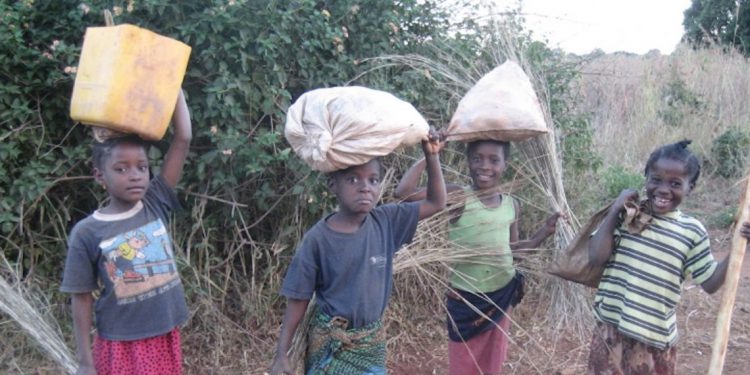Businesses should “prevent, address and effectively remedy human rights abuses across their entire supply chains, making the information public through due diligence,” according to Michael Fakhri the UN Rapporteur on the Right to Food.
He told the UN General Assembly that businesses should hold their subsidiaries responsible for human rights abuses. Business due diligence protect human rights
In his interim report on the right to food, ahead of the UN Food Systems Summit, Michael Fakhri writes that “The Summit’s late attempt to imbue its process and outcomes with human rights-based perspectives has not succeeded… ” Business due diligence protect human rights
He says the food system’s problems are caused by contracts and property laws that have “licensed investors to use corporations to violate people’s human rights.”
“People use corporations to ensure that they will not be held responsible for committing human rights abuses,” he writes.
“Corporations must at least respect people’s human rights”
“Under investment treaties, foreign corporations can bring claims against governments. However, local people and governments do not have the right to hold foreign corporations (or any foreign investor) liable and bring claims under these treaties.
“Investment treaties grant transnational corporations rights that are stronger than local communities’ human rights, without including any corporate obligations.
“The corporate form allows investors to evade domestic liability in their host State. This has excused corporations from local labour and environmental laws, leading to an increase in human rights abuses in global supply chains.
“States must at least protect people’s rights from corporate power… and corporations must at least respect people’s human rights.”
“Child labour around the world has increased to 160 million”
He says companies should ratify and enact international labour treaties, enforce national labour laws and extend labour protection to agricultural workers, adding “The International Labor Organization Convention on the Right of Association and the recently ratified Convention on the Worst Forms of Child Labour 1999 are more important than ever.”
Of particular concern is the steep rise child labour in the past year of the Covid pandemic – 70 per cent of which is in agriculture. He writes that “child labour around the world has increased to 160 million, the first rise in 20 years.
“The concern is that millions more will be soon pushed into work.
“The violation of children’s rights stems from the fact that families are so poor that they are forced to put their children to work or provide them with poor diets.
“People are poor because their own rights are being violated: working conditions are detrimental to their health and safety, people are paid below the living wage, and they have insufficient social protection. In other words, children’s rights are increasingly being violated because the underlying system is unjust to all workers.”
“Women are the first to go hungry”
He adds that “women are likely to be the first to go hungry, while also bearing the responsibility of feeding their families. They make up a significant proportion of informal workers or smallholder producers, who have been hit hardest by the economic fallout of Covid-19.
“Moreover, women often face discrimination in land and livestock ownership and in pay. Women’s care work, paid and unpaid, has risen dramatically in recent months because of illness and school closures.”
Michael Fakhri writes that to date, no Indigenous/traditional knowledge holders are part of the Scientific Group, and it appears that such knowledge is still in the margins.
He includes a recommendation to business that they should not operate in a territory without the free, prior and informed consent of Indigenous peoples. And that all states should enact the United Nations Declaration on the Rights of Peasants and the Declaration on the Rights of Indigenous Peoples through national policy and legal frameworks.
“Contracts usually benefit middle-purchasers and the final corporate buyer”
On farming more generally, he writes that industrial intensification was designed to make farmers dependent on the expensive inputs provided by agrochemical companies, saying “Four agrochemical companies control 60 per cent of the global seed market and 75 per cent of the global pesticides market.
“The Big Four seed companies produce most of the agrochemicals associated with genetically modified seeds. Those agrochemicals reduce biodiversity, which lowers agricultural resilience, making farms more vulnerable to climate change shocks.
“Law is an integral part of this process. Small-scale farmers are being encouraged to engage in “contract farming”. However, the contracts usually benefit middle-purchasers throughout the supply chain and the final corporate buyer, leaving farmers and workers with inconsistent and often detrimental results, deepening inequality and dispossession.”
He says agroecology is the best approach to efficiently and effectively use natural resources to fulfil the right to food, writing that the Food and Agriculture Organization has created an agroecology team, “Nevertheless, agroecology was not taken up by the [Food Systems] Summit secretariat, action tracks or the Scientific Group from the outset. After a campaign of more than a year, agroecology was finally put on the Summit agenda through action track 3.”
“Free school meals all year fulfil children’s right to food”
He says that free meals at school for children during the entire calendar year has proven to be the most effective way to fulfil children’s right to food, “and strengthens families and communities.” So all levels of government should ensure this is delivered.
“Supply these universal school feeding programmes through public procurement programmes that connect local, national and regional producers to school kitchens,” he writes.
“These programmes could transform food systems and support territorial markets in a way that fulfils people’s right to food.”























